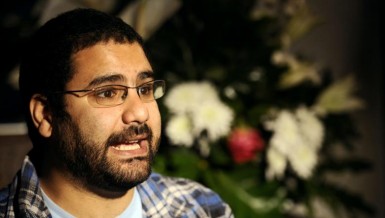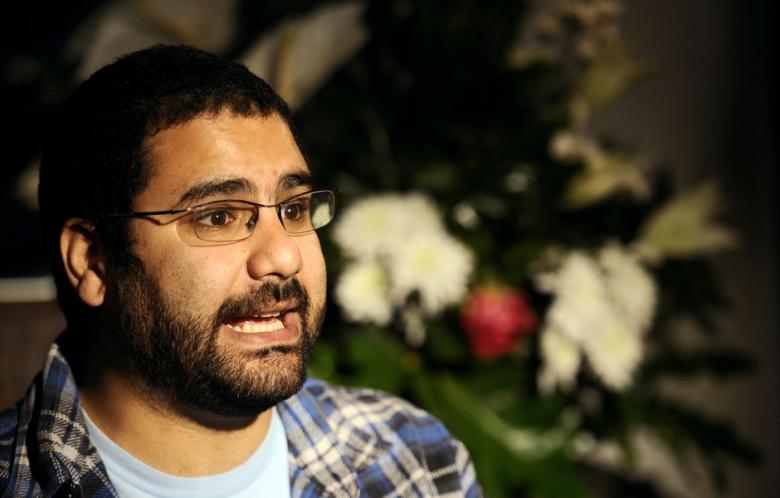
(AFP File Photo)
Activist Alaa Abdel Fattah described on Tuesday his temporary release on bail as a “conspiracy” carried out by the authorities.
“I don’t deny the fact that my temporary release is a conspiracy like the case with my imprisonment,” Abdel Fattah said. “This applies to all [the other] prisoners,” Abdel Fattah said on his Facebook page.
“There are no courts… neither is there justice… there are only plots,” he said.
The Cairo Appeal Court is expected to assign a new judge to look into Abdel Fattah’s case after he was released and ordered to pay bail of EGP 5,000 on Monday. The judge presiding over their Shura Council trial ordered Fattah’s release on bail, before recusing himself from the case.
“The authorities decide to imprison [me] then set [me] free… these are matters that abide by their moods and whims,” Abdel Fattah said.
“Nobody in Egypt has any doubts that the law and the constitution do not have anything to do with this issue,” he added.
In June, Abdel Fattah and 24 other defendants were sentenced in absentia to 15 years, handed an EGP 100,000 fine and put under surveillance for a period of five years. They were found guilty of violating the Protest Law—issued by the then-interim president Adly Mansour in November 2013—after protesting outside the Shura Council (the upper house of the parliament).
Abdel Fattah called on his fellow activists to consider practical ways to seize any partial gains for supporting their cause and abolishing the Protest Law, such as convincing other prisoners to join the “Campaign of Empty Stomachs”.
“What’s important now is that we organise ourselves and pressure the authorities that conspire against us,” he said.
His family, meanwhile, said they would continue their hunger strike until the status of his sister Sanaa Seif, also detained, is determined.
“I have previously announced that I would go on striking until my two children, Alaa and Sanaa, are released,” activist Laila Soueif said. “But in general, I’m on a hunger strike to protest against the detention and imprisonment of the others [jailed over similar charges].”
“This is the same stance of both my children Alaa and [activist] Mona [Seif],” Soueif added.
Soueif said the family’s stance towards the hunger strike will be further decided after they visit Sanaa in jail Wednesday.
“Sanaa was in a bad condition two days ago but a friend who visited her yesterday said she got better,” the mother said.
Sanaa Seif had earlier had begun an open-ended hunger strike in August, one week after her brother took the same action.
A member of the No Military Trials for Civilians group, Sanaa Seif was arrested in late June at Itihadiya while demonstrating for her brother’s freedom and against the Protest Law. She is now in custody awaiting trial.
Abdel Fattah and the other defendants were also charged with demonstrating against military trials for civilians outside the Shura Council, acquiring weapons during the protest, illegal assembly, and attacking a police officer and stealing his radio.
The defendants in the case currently not in prison started an open-ended hunger strike in early September in solidarity with their fellow activists in custody. They also called for the abolishment of the controversial Protest Law and the release of all political detainees.
Soueif called on the media to shed light on other prisoners.
“Ibrahim Al-Yamani has been on hunger strike for over 100 days and he is currently in a critical condition,” she said.
Al-Yamani, a medical doctor, was arrested while working at the field hospital set up during Al-Fath mosque protests following the dispersal of Rabaa open sit-in that followed the ouster of Morsi. He has been detained at Wady Al-Natroun Prison pending trial.
“The fact that he is affiliated with the Muslim Brotherhood doesn’t deny him the right to be focused on,” Soueif said.
“It is disgraceful how his case is being dealt with,” she added.

